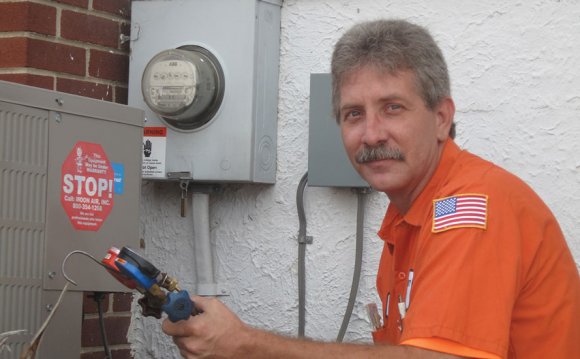
1) Your air conditioner is not working at all. Before calling in a professional to address this issue, you may want to check a few things yourself. Check to see if your thermostat is set to “cool”. Confirm that your designated cooling temperature is less than the temperature of the room or home. If everything is set correctly, check the electrical panel to be sure you do not have a tripped breaker. If these things all check out and your air condition unit is still not working, it is time to call in a professional.
2) You hear the unit running, but there is little or no cool air coming out of your vents. If your thermostat is set to a reasonable temperature and your home is still uncomfortably warm, your air conditioner is not doing its job correctly.
3) Your air conditioner is making strange noises. You are likely familiar with the typical noises your unit makes as it cycles. In fact, if you live in a warmer climate, your unit’s normal noise is a steady part of the background music of your life. So, when you hear noises that sound different from the norm, it is time to call for repairs.
4) Your air conditioner smells bad. Unusual odors coming from your unit indicate there is dirt, mold, or mildew inside your unit which can circulate contaminated air through your home. Bad smells are more than just a nuisance. They indicate a problem which needs to be addressed right away to avoid health issues for your family.
5) Your air conditioner is short cycling. It is perfectly normal for your air conditioner to cycle on and off to maintain a set temperature throughout your home. However, if you notice that it is turning on and off more frequently than usual and the outside temperature is not particularly warmer than normal, it is possible that your unit is malfunctioning. Short cycling puts extra stress on your air conditioner, and can cause it to fail entirely if not handled quickly.
6) Water is leaking in and around your unit. While a small amount of condensation is normal for your unit, excessive water is an indication of problems. Because your air conditioner has electrical components which must be protected from water damage, you will need to contact an HVAC repair person for help.
7) Your unit is icy or frosty. Just as excessive water indicates a problem, so too ice or frost in your air conditioner is problematic. Blocked or restricted airflow can lead to ice buildup, which can literally cause your unit to freeze.
If you detect any of these signs that your AC is malfunctioning, it is wise to call a professional AC repair pro. After all, the reason you have an air conditioner is for your comfort. If you are uncomfortable, it is time to call for help.
Can You Postpone a Repair?
Although your AC may continue to work for a time, if you ignore warning signs of air conditioner repair troubles, it can be much more costly to repair in the long term. Diminished cooling capacity not only makes your home uncomfortably warm, but it also raises your utility bills significantly as your unit struggles to maintain the desired temperature ineffectively. A system put under strain is likely to overheat, resulting in major damage. Therefore, it is best to have your air conditioner repaired promptly when you discover signs of trouble.
What to Look for in a Professional Service
First, it is wise to stick with a company that specializes in HVAC services. While many general handyman companies may do some things with AC units, a company that specializes in air conditioning and heating is always a better option. Because air conditioning repairs can be quite costly, depending on the particular problem, it is best to work with highly trained HVAC professionals to ensure quality work.
1) Do your homework. Check licensing and insurance requirements in your state. Research the background of the company you choose. Licensing information should be clearly displayed on repair trucks, paperwork, and marketing pieces.
2) Make a list. Before you talk with an HVAC repair service, know the model of your system and any maintenance history. Check to see if your unit is still under warranty. Make a list of your concerns to ensure you do not forget anything important for your repair pro to know.
3) Compare prices and service packages. If possible, get at least three estimates for any repair or maintenance work. All estimates should be in writing and should provide a full description of the services to be provided and the materials to be used.
4) Get referrals. Check with family and friends to get the names of HVAC professionals in your area. If that fails to yield results, ask the local Better Business Bureau or Chamber of Commerce in your area for suggestions.
5) Check certifications. Many HVAC professionals belong to the Air Conditioning Contractors of America (ACCA) or the Sheet Metal and Air Conditioning Contractors’ National Association (SMACNA). Both sites provide listings of HVAC contractors by area. Look for contractors whose technicians are certified by North American Technician Excellence (NATE) and partnered with ENERGY STAR.
A few additional things to look for may be whether the repair technicians are courteous and present themselves professionally, and whether company vehicles appear to be well-maintained. These things will indicate, to some extent, the type of workmanship you can expect to receive.









